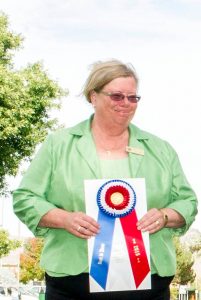345 – Ideas to Grow Our Sport: Amateur CH, Critiques, Welcome
Ideas to Grow Our Sport: Amateur Champion, Critiques, Welcome
Join a conversation between judges and exhibitors brainstorming ideas to grow the sport of purebred dogs. Lesley Hiltz, Karen Ericson and Sid Marx join moderator Laura Reeves along with exhibitors at the Whidbey Island Kennel Club.
This is part two of the Pure Dog Talk Saturday Symposium posted last week. The Q&A discussion examined various perspectives on ideas to help increase conformation numbers and enthusiasm.
Building on a suggestion from Marx in part one, audience questions focused on the idea of creating an actual amateur championship, akin to the same title in field trials, for the sport of conformation.
“I’ve always thought there should be an amateur division and an open division everyone can enter,” Ericson said, similar to horse shows.
“In Australia, every kennel club is only allowed one Championship show a year and are required to hold an open show, where no points are awarded,” Hiltz added.
Marx spoke to the idea of a “breed level show” judged by provisional judges and “group shows” judged by regular status judges. Provisional judges can learn at the “breed level” where they can take more time.
Critiques redux
A common theme in our exhibitor conversations is the ongoing desire for critiques.
Our judge panelists, who judge internationally, spoke to the practice in other systems.
Hiltz noted that in Denmark, for example, judges receive extensive training in the skills required to offer useful critiques. She also noted that technology is such that the judges words are uploaded almost instantaneously.
One exhibitor comment referenced the common practice in livestock/4-H judging whereby judges give reasons for each placement
“We give critiques to the rep after we judge when we have provisional breeds. If we can do that, we should be able to give them for exhibitors as well,” Marx observed.
Ericson noted that all judges have a learning curve. “It’s easy to pick out faults. There’s a real training process to pick out virtues and achieve positive judging.”
On those same lines, Marx made a point about the process that judges go through and that while adult learners do best when they use their knowledge right away, the process in place functionally means judges receive provisional approval and it might be a year before they have a chance to judge.
Ericson reminded the participants that dog shows can be intimidating for new folks. “We just have to be a lot more welcoming.”
343 — Saturday Symposium – Preservation Breeding With Experts
Saturday Symposium – Preservation Breeding With Experts
Host and Moderator Laura Reeves is joined by breeders/judges Lesley Hiltz, Sid Marx and Karen Ericson at the Whidbey Island Kennel Club with a robust conversation about preservation breeding. This is part one. Part two, including audience participation, conversation and more idea generation will be posted next Monday.
Preservation of our breeds to save their place in history

Lesley Hiltz
“When you judge in Europe,” Hiltz noted, “the average exhibitor age is mid 30s. There are lots of families, often three generations together. It’s a family sport. But they also only have one show a month. If we had fewer shows we could see more support for the ones remaining.”
Marx observed that too often exhibitors haven’t even read the standard for their breed.
“People become captive to what’s winning. Breeding to what’s winning rather than what’s correct. We want to get as many new young exhibitors involved in the sport as we can. But they need to make an effort to find mentors and learn the history of their breed,” Marx said.

Sid Marx
Ericson encouraged folks to “Get our dogs out among the public.” Clubs need to do things besides dog shows, she added.
“To get a dog from a breeder, you might as well apply to be a CEO of a fortune 500 company,” Erickson said. “Trust people with your best, not your worst. Tell them you are trusting them with a piece of my heart and legacy.”
“Dog shows in Australia are less stressful and more fun,” Marx said. “Certainly more wine is drunk. It’s a party at their shows. It’s an event.”
Proactive policies

Karen Ericson
Some ideas from the panelists:
- Encourage altered dog competition
- Encourage anyone who shows a spark to come to the dog show. Stop what you’re doing and share with public. Share excitement about the show.
- Bring back dog shows that stop at the breed level. Rankings are hurting us. The average person isn’t at the dog show to fight for Group 1.
- Follow Austalia’s lead: “class in group awards.” So if your 6-9 puppy wins his class, he competes in 6-9 competition in group. People stay for group, talk to other people in other breeds. Gives a whole lot of other people the chance to win something in group.
To hear previous discussions on this topic, click here and here


